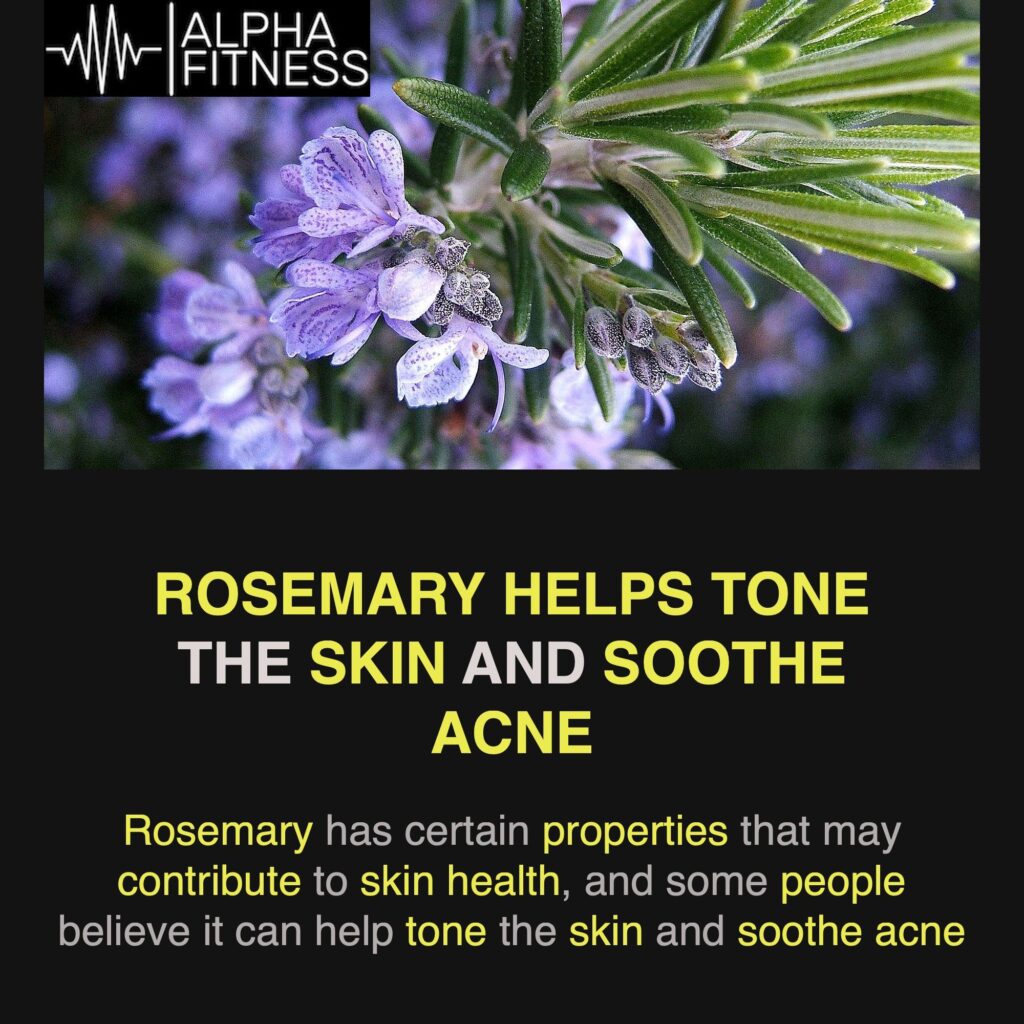
Rosemary has certain properties that may contribute to skin health, and some people believe it can help tone the skin and soothe acne. While these claims are based on traditional uses and anecdotal evidence, there is limited scientific research specifically addressing the effects of rosemary on acne. Here are some potential ways in which rosemary may impact the skin:
Astringent Properties:
Pore Constriction: Astringents like rosemary are believed to constrict blood vessels and pores, leading to a temporary tightening of the skin. This property can make the skin appear firmer and reduce the visibility of pores. For individuals with oily skin, astringents can also help control excess oil production.
Antioxidant Effects:
Free Radical Protection: Rosemary is rich in antioxidants, which can help protect the skin from free radicals. Free radicals are unstable molecules generated by factors like sun exposure, pollution, and stress. They can contribute to skin aging and inflammation. Antioxidants in rosemary, such as rosmarinic acid, work to neutralize these free radicals, promoting healthier and more resilient skin.
Anti-Inflammatory Properties:
Reduction of Inflammation: Inflammation is a key component in the development of acne. Rosemary’s anti-inflammatory properties may help calm and soothe irritated skin, reducing redness and discomfort associated with acne lesions.
Oil Balancing:
Control of Excess Oil: For individuals with oily or acne-prone skin, excess oil can contribute to the development of acne. Astringents like rosemary may help control oil production, providing a mattifying effect and minimizing the appearance of shine.
Antibacterial and Antimicrobial Effects:
Acne-Causing Bacteria: Rosemary has been explored for its potential antibacterial and antimicrobial properties. While more research is needed, these properties could be beneficial in addressing the bacteria that contribute to acne formation.
Application Methods:
Rosemary Toner: A homemade rosemary toner can be created by steeping fresh or dried rosemary in hot water and allowing it to cool. Applied after cleansing, it can provide a refreshing and toning effect on the skin.
Rosemary-Infused Oil: Infusing rosemary in a carrier oil creates a botanical oil that can be applied to the skin. This can serve as a moisturizing treatment with potential added benefits of rosemary for the skin.
Commercial Skincare Products: Many skincare products, including cleansers, toners, and creams, may incorporate rosemary extract for its potential skin benefits. Look for products specifically formulated for your skin type.
Important Considerations:
Patch Test: Before using any new skincare product or ingredient, it’s recommended to perform a patch test. This helps identify potential allergic reactions or sensitivities.
Individual Variability: The effectiveness of rosemary for skin concerns can vary among individuals. Factors such as skin type, existing skin conditions, and overall health play a role in how well the herb may work for a particular person.
Consultation with a Dermatologist: If you have persistent or severe acne or if you’re uncertain about incorporating rosemary into your skincare routine, consulting with a dermatologist is advisable. A dermatologist can assess your skin, provide personalized recommendations, and address specific concerns.
Below is a list of useful links:
- Squats gives you a tightly toned appearance
- Apricot kernel oil soothes inflammation
- Is marjoram good for skincare?
- Tomato can help to remove excess oil
- Sandalwood oil helps nourish the skin
While rosemary is generally considered safe for topical use, it’s crucial to approach skincare with a holistic perspective. This includes maintaining a balanced and nutritious diet, staying hydrated, and practicing good overall skincare habits. Additionally, individual responses to skincare ingredients can vary, so it’s important to monitor how your skin reacts to any new product or ingredient.



